将来时future tenses
图片预览
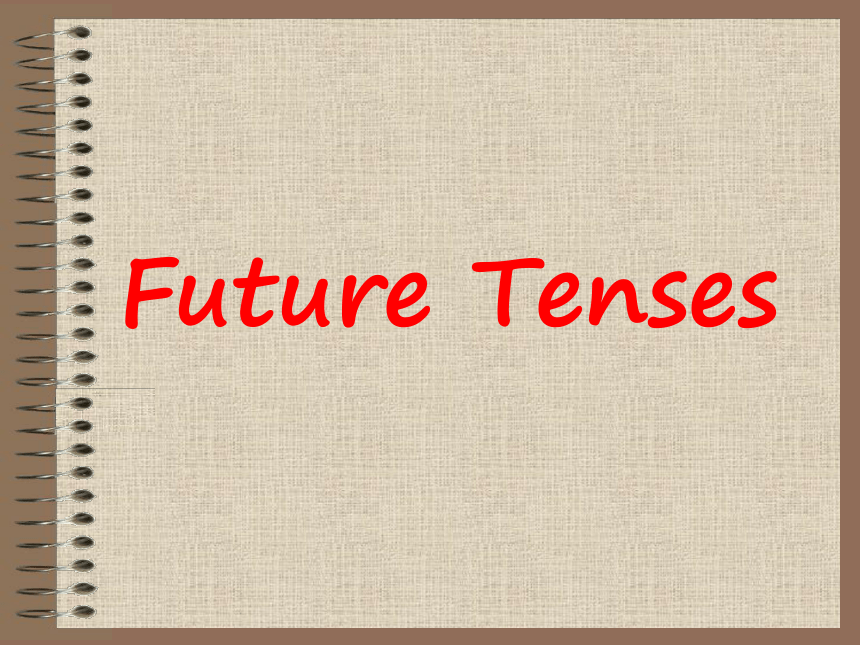
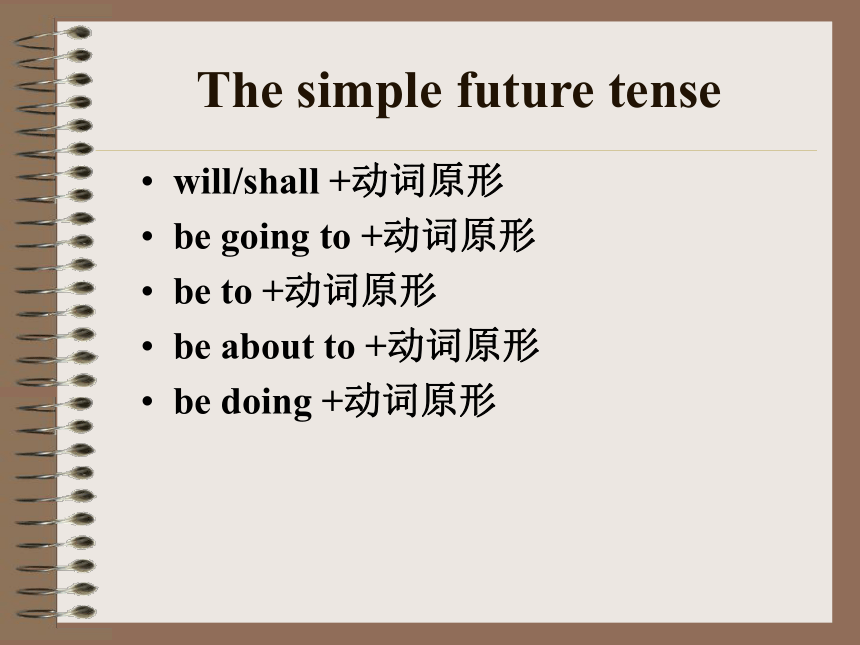

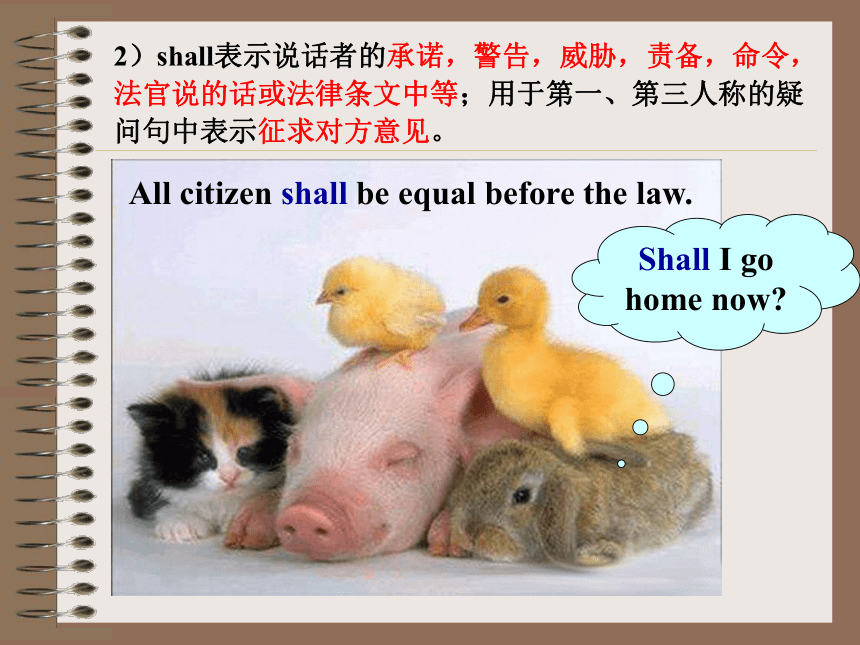
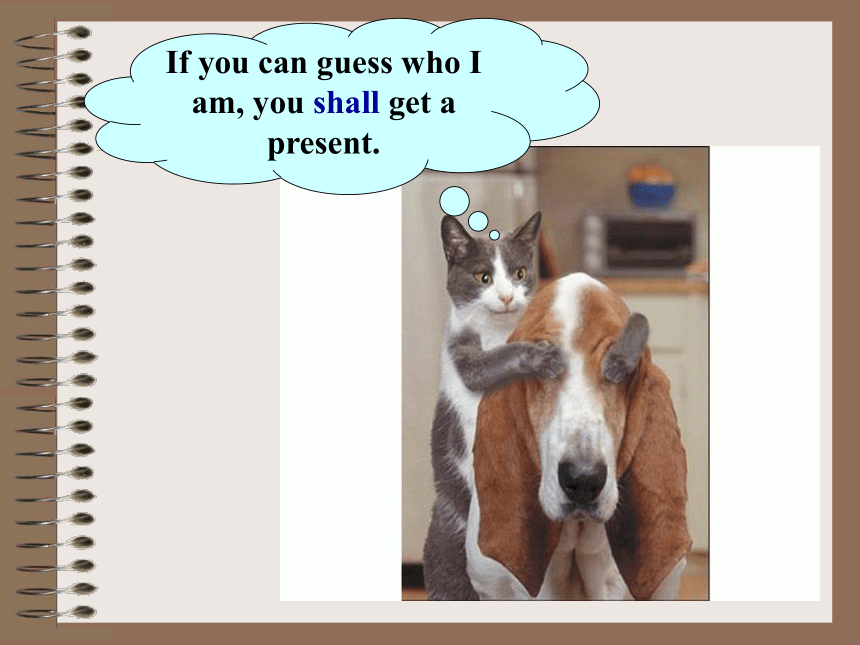

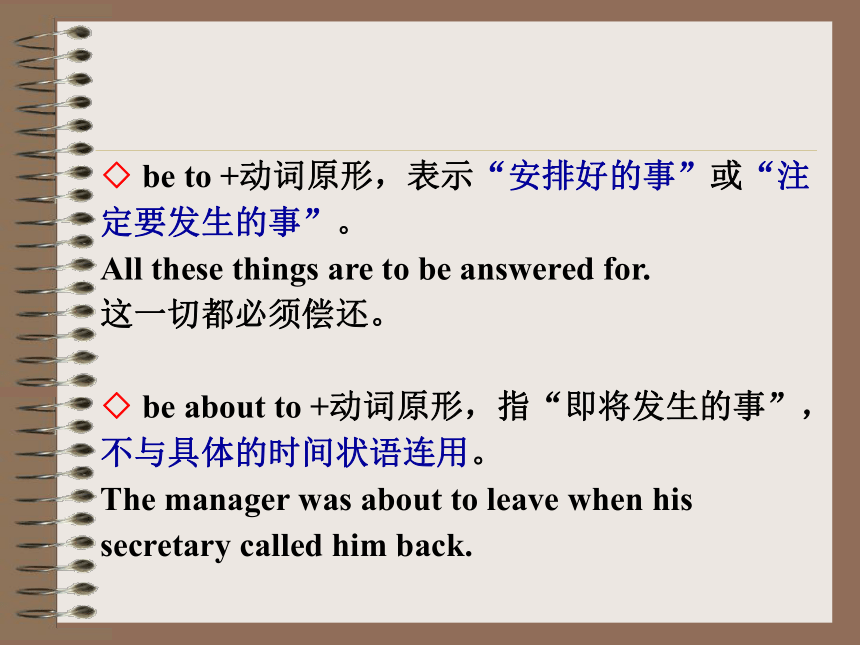
文档简介
课件16张PPT。Future TensesThe simple future tensewill/shall +动词原形
be going to +动词原形
be to +动词原形
be about to +动词原形
be doing +动词原形Will you marry me?1) will表示意愿;用于第二人称的疑问句中表示请求。All citizen shall be equal before the law.2)shall表示说话者的承诺,警告,威胁,责备,命令,法官说的话或法律条文中等;用于第一、第三人称的疑问句中表示征求对方意见。Shall I go home now?If you can guess who I am, you shall get a present.It is going to rain, but I forget to take my umbrella!3) be going to +动词原形,表示打算做某事;表示计划,安排要发生的事 ;表示有迹象要发生的事;或表示很有可能要发生某事。◇ be to +动词原形,表示“安排好的事”或“注定要发生的事”。
All these things are to be answered for.
这一切都必须偿还。
◇ be about to +动词原形,指“即将发生的事”,不与具体的时间状语连用。
The manager was about to leave when his secretary called him back.The future continuous tense 表示在将来某一时刻或某一段时间正在进行的动作或存在的状态,常常带有时间状语或时间状语从句。
At this time tomorrow, we will be lying on the plate.The future in the past常用在宾语从句中,表示从过去某一时间来看将要发生的动作或存在的状态。
I didn’t know if he would come.
形式:
would + do /be done
was/were going to do/ be done
was/were to do/be done
was/were about to do/be done
was/were doing (表示位置移动的词)Whatever happens, I will be with you.He told me that he would be with me
whatever happened.The future perfect tense表示在将来某一时间以前已经完成的动作,与before+将来时间或by+将来时间连用,也可与before或by the time引导的现在时的从句连用。
The children will have gone to sleep by the time we get home.
注意:使用这种时态时,多会涉及两个动作或状态,一个在前,一个在后;叙述前面的动作或状态,动词要用将来完成时;叙述后面的动作或状态,动词要用一般现在时。 By the end of this term, we will have learned more than 2000 words. (2009年江苏卷)-Ann is in hospital.
-Oh, really? I ___ know. I ___ go and visit her.
didn’t; am going to B. don’t; would
C. don’t; will D. didn’t; will
(2010年浙江卷)If you plant watermelon seeds in the spring, you ___ fresh watermelon in the fall.
A. eat B. would eat
C. have eaten D. will be eating(2010年全国卷Ⅰ)The discovery of gold in Australia led thousands to believe that a fortune _____.
A. is made B. would make
C. was to made D. had made
(2010年福建卷)-Guess what, we’ve got our visas for a short-term visit to the UK this summer.
-How nice! You ____ a different culture then.
A. will be experiencing B. have experienced
C. have been experiencing D. will have experienced
单句改错:
I haven’t seen Jim recently but I would be
seeing him over Christmas.
2. He is about to leave tomorrow.
3. I told her I returned the book in a few days.
翻译句子:
不久他就会全然忘记这件事的。
他说他将在大门口等我。willwould returnBefore long he will have forgotten all about the matter.He said he would wait for me at the gate.Bye bye!
be going to +动词原形
be to +动词原形
be about to +动词原形
be doing +动词原形Will you marry me?1) will表示意愿;用于第二人称的疑问句中表示请求。All citizen shall be equal before the law.2)shall表示说话者的承诺,警告,威胁,责备,命令,法官说的话或法律条文中等;用于第一、第三人称的疑问句中表示征求对方意见。Shall I go home now?If you can guess who I am, you shall get a present.It is going to rain, but I forget to take my umbrella!3) be going to +动词原形,表示打算做某事;表示计划,安排要发生的事 ;表示有迹象要发生的事;或表示很有可能要发生某事。◇ be to +动词原形,表示“安排好的事”或“注定要发生的事”。
All these things are to be answered for.
这一切都必须偿还。
◇ be about to +动词原形,指“即将发生的事”,不与具体的时间状语连用。
The manager was about to leave when his secretary called him back.The future continuous tense 表示在将来某一时刻或某一段时间正在进行的动作或存在的状态,常常带有时间状语或时间状语从句。
At this time tomorrow, we will be lying on the plate.The future in the past常用在宾语从句中,表示从过去某一时间来看将要发生的动作或存在的状态。
I didn’t know if he would come.
形式:
would + do /be done
was/were going to do/ be done
was/were to do/be done
was/were about to do/be done
was/were doing (表示位置移动的词)Whatever happens, I will be with you.He told me that he would be with me
whatever happened.The future perfect tense表示在将来某一时间以前已经完成的动作,与before+将来时间或by+将来时间连用,也可与before或by the time引导的现在时的从句连用。
The children will have gone to sleep by the time we get home.
注意:使用这种时态时,多会涉及两个动作或状态,一个在前,一个在后;叙述前面的动作或状态,动词要用将来完成时;叙述后面的动作或状态,动词要用一般现在时。 By the end of this term, we will have learned more than 2000 words. (2009年江苏卷)-Ann is in hospital.
-Oh, really? I ___ know. I ___ go and visit her.
didn’t; am going to B. don’t; would
C. don’t; will D. didn’t; will
(2010年浙江卷)If you plant watermelon seeds in the spring, you ___ fresh watermelon in the fall.
A. eat B. would eat
C. have eaten D. will be eating(2010年全国卷Ⅰ)The discovery of gold in Australia led thousands to believe that a fortune _____.
A. is made B. would make
C. was to made D. had made
(2010年福建卷)-Guess what, we’ve got our visas for a short-term visit to the UK this summer.
-How nice! You ____ a different culture then.
A. will be experiencing B. have experienced
C. have been experiencing D. will have experienced
单句改错:
I haven’t seen Jim recently but I would be
seeing him over Christmas.
2. He is about to leave tomorrow.
3. I told her I returned the book in a few days.
翻译句子:
不久他就会全然忘记这件事的。
他说他将在大门口等我。willwould returnBefore long he will have forgotten all about the matter.He said he would wait for me at the gate.Bye bye!
